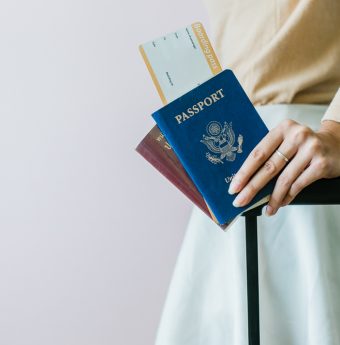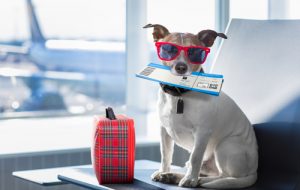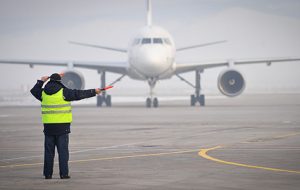Keeping Your Passport Safe and Other Travel Safety Tips
Updated As of read 4 min

Traveling abroad can be one of the most memorable experiences of your life. Science has even proven that there are health benefits associated with collecting stamps in your passport.
If you have a trip coming up, you’ll want to make sure that you can enjoy every second of it — and that definitely doesn’t include losing your passport. Without that important travel document, all of your amazing plans could come to a stop.
Learn how to keep your passport safe with these key travel safety tips.
1. Know When You Need It
In some countries, you might need to keep your passport or other forms of identification on you at all times. In others, it’s okay if you leave it back in your hotel room.
You might not even need your passport to travel if you’re driving or taking a train across a border. If you’re driving to Canada, for example, it might not be necessary. (Always double check this before you leave without your passport, though.)
One way you can keep your passport safe is by only carrying it with you if absolutely necessary.
2. Keep It Hidden
When you do have your passport with you as you explore your new location, make sure you keep it hidden at all times. Pickpockets are a real threat in some countries. The last thing you want is to be in a foreign country without a passport.
To reduce the risk of having your passport stolen, use something like a money belt if possible. You can also wear your passport in a pouch tucked under your clothing so that it’s not obvious.
Above all, you want to avoid pulling out things like your passport in public.
3. Lock It Up
If carrying your passport with you makes you nervous and you know you won’t need it that day, don’t just leave your passport unattended in your room. (This is especially important if you’re in a hostel, Air BnB, or any other kind of shared living space.)
No matter how safe you think your things are, you should always lock up your passport if it’s not on your person. If you’re staying in a hotel, your room might have a safe in it where you can keep your passports. If there’s no safe, lock it inside your luggage and keep that somewhere secure.
A loose passport is asking for trouble.
4. Stay Aware
No matter what you choose, you should always stay aware of your surroundings. While it’s easy to get caught up in all of the new sights and experiences, pickpockets thrive on distraction.
Getting too caught up in the moment could put you at risk of having your valuables stolen.
You don’t have to be jumpy or scared, but it’s best to have a level of situational awareness at all times. Understand the area that you’re in and be careful in crowded spaces. Packed public transportation offers a good cover for people to “accidentally” bump into you and walk away with your belongings.
5. Make Copies
No one wants to be in a situation where their passport is stolen. If the worst happens, though, you’re going to need to be prepared. The best thing you can do is have multiple copies of your passport available.
The first place you should go if your passport is stolen is to the United States embassy. They’ll be able to help you get a new passport much faster if you already have a scan of your passport to help verify your identity.
Before you go, leave a copy or two with your friends and family as well. If you lose it, you’ll be able to call them up to check important information like your passport number.
6. Separate Your Valuables
Back at home, you might carry everything in one place. Men tend to have all of their important cards and cash in a wallet, while women carry all of their valuables in their purses.
It’s tempting to do the same thing when you’re abroad. If your wallet is stolen, though, then everything important is gone — and a bad situation just got worse.
Instead, make sure that you separate your valuables. Don’t store your passport copies in the same place as your passport, and don’t keep cash with your passport. That way, even in a worst case scenario, you haven’t lost everything.
7. Double Check in Private
If you’re being really careful with all of your documents, you’re probably going to want to double check just to make sure that everything is still in place. You might even find yourself touching where your valuables are without even thinking about it.
Whatever you do, don’t double check in public to make sure that your passport is still where you put it. You might grant yourself some peace of mind, but you also just let everyone else around you know where your passport is!
Instead, wait until you’re in private to check on your valuables. A good place to do this is in a bathroom stall where no one else can see you.
8. Don’t Give It to Anyone Else
This one might seem like a no-brainer, but you’d be surprised how common situations are when people ask to hold on to your passports.
Whether it’s hotel staff who insist that they have to keep your passport for the duration of your stay or a security guard who asks for identification, there are a variety of reasons someone might ask to keep your passport. Unless they’re a government official, this is not a good idea.
If they absolutely must keep some form of your identification, see if a passport copy will work instead. In some cases, you can also use an enhanced driver’s license or state ID card.
Use These Travel Safety Tips on Your Next Trip
The next time you travel out of the country, make sure you keep these travel safety tips in mind. You’ll make sure that your experience is memorable for all the right reasons!
Don’t have your passport quite yet? Don’t worry — we can help you figure that out. Check out our guide to learn more about the process of applying for a United States passport.



